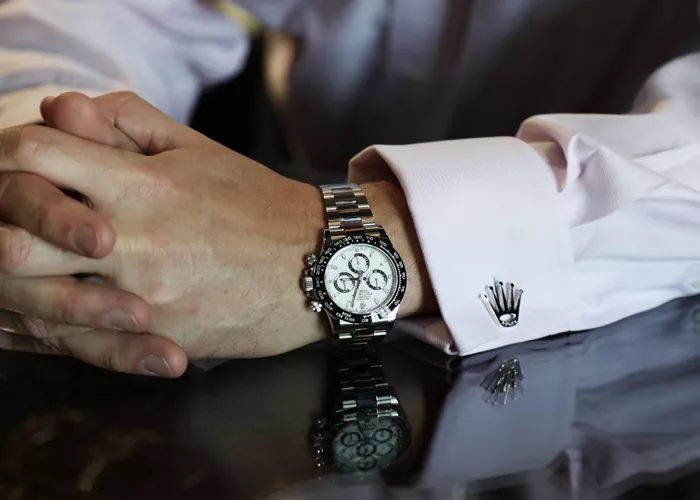The Rolex Cosmograph Daytona is a legendary chronograph timepiece, first introduced in 1963. Designed with professional racing drivers in mind, it has evolved into one of the most iconic and sought-after luxury watches in the world. Its robust construction, timeless aesthetics, and high-performance chronograph functions make it a collector’s favorite.
One of the most significant upgrades to the Daytona came with the introduction of the ceramic bezel. This enhancement not only improved the durability and functionality of the watch but also elevated its aesthetic appeal. This article explores what makes the ceramic bezel Daytona unique, its advantages, evolution, and why it’s highly coveted among horology enthusiasts.
Understanding the Bezel: Function and Importance
A bezel is the ring surrounding the watch dial, often holding the crystal in place. In chronograph watches like the Daytona, the bezel can also serve a functional purpose. The Daytona features a tachymeter scale on the bezel, used to measure speed based on travel time or distance based on speed.
Traditional bezels were made from metal such as stainless steel, gold, or aluminum. While functional and durable to an extent, these materials were prone to scratching and fading over time. This led to the development of more advanced materials like ceramic.
The Evolution of the Daytona Bezel
Initially, the Rolex Daytona featured metal bezels. These bezels, though stylish and functional, lacked resistance to scratches and environmental wear. Over the years, Rolex began experimenting with more robust materials.
The ceramic bezel was first introduced to the Daytona line in 2011 with the release of the Everose gold Daytona (reference 116515LN), which featured a black Cerachrom bezel. This marked a turning point in the model’s design.
In 2016, Rolex unveiled the highly anticipated stainless steel Daytona (reference 116500LN) with a black ceramic bezel. This model replaced the long-standing reference 116520 and became an instant success, with waiting lists at authorized dealers growing substantially.
What is Cerachrom?
Cerachrom is Rolex’s proprietary ceramic material, developed in-house to combine aesthetic excellence with superior durability. The name “Cerachrom” is derived from a blend of the words “ceramic” and “chrom” (color).
Key Properties of Cerachrom:
- Scratch Resistance: Ceramic is significantly harder than metal. Cerachrom bezels are virtually scratch-proof.
- Fade Resistance: Unlike aluminum bezels that fade over time, Cerachrom maintains its deep color indefinitely.
- Corrosion Resistance: Cerachrom does not corrode or deteriorate due to exposure to UV rays, saltwater, or harsh chemicals.
- Polished Appearance: The ceramic bezel can be polished to a high gloss, giving it a luxurious appearance that complements the rest of the watch.
Ceramic Bezel Daytona Models
The ceramic bezel is now a signature feature across many Daytona models. Notable examples include:
Rolex Daytona 116500LN
- Material: Oystersteel (Rolex’s 904L stainless steel)
- Bezel: Black Cerachrom with engraved tachymeter scale
- Dial Options: White or black dial
- Significance: The first stainless steel Daytona with a ceramic bezel; extremely popular and often sold above retail.
Rolex Daytona 116515LN
- Material: 18k Everose gold
- Bezel: Black Cerachrom
- Strap: Oysterflex rubber strap
- Dial Options: Multiple, including chocolate and pink dials
Rolex Daytona 116518LN and 116519LN
- Materials: 18k yellow gold and white gold respectively
- Bezel: Black Cerachrom
- Strap: Oysterflex
Rolex Daytona 126500LN (2023 Release)
- Material: Oystersteel
- Bezel: Black Cerachrom, redesigned with a metal rim
- Upgrades: New movement (Caliber 4131), subtle case refinements, transparent case back (in some versions)
Advantages of the Ceramic Bezel
The ceramic bezel enhances the Daytona’s functionality and appearance. Here are its key benefits:
1. Durability
Ceramic is highly resistant to scratches, ensuring the bezel remains pristine for years. This is particularly important for collectors and everyday users who want their watch to retain its value and look.
2. UV and Chemical Resistance
The Cerachrom bezel does not fade or discolor due to sun exposure or chemicals, a common issue with older aluminum bezels.
3. Aesthetic Appeal
The high-gloss finish of ceramic gives the watch a sleek, modern look while maintaining the Daytona’s classic silhouette.
4. Longevity
Ceramic maintains its appearance far longer than metal bezels, which can dull or accumulate scratches over time.
5. Prestige
Ceramic bezel Daytonas, especially the stainless steel variants, have become synonymous with modern luxury, driving high demand and secondary market premiums.
Market Impact of Ceramic Bezel Daytonas
The introduction of ceramic bezels transformed the Daytona’s desirability. The 116500LN model, in particular, became a sensation.
Strong Resale Value
The Daytona 116500LN consistently commands prices far above retail on the secondary market due to its combination of classic design and modern technology.
Collector’s Appeal
Collectors value the ceramic bezel for its durability and the aesthetic enhancement it brings. As Rolex produces limited quantities annually, scarcity further fuels demand.
Waitlist Phenomenon
Due to overwhelming demand and Rolex’s conservative production model, ceramic bezel Daytonas often come with years-long waiting lists at authorized dealers.
Comparing Ceramic vs. Metal Bezels
Metal Bezels
- Pros: Traditional look, vintage appeal, easier to manufacture
- Cons: Prone to scratches, fading, and general wear
Ceramic Bezels
- Pros: Scratch-proof, fade-resistant, modern appearance, superior durability
- Cons: More expensive to produce, potential for shattering under extreme impact
Maintenance and Care of Ceramic Bezel Daytonas
Despite their toughness, ceramic bezels still require proper care:
- Avoid Extreme Shocks: While ceramic is hard, it can be brittle under extreme force.
- Regular Cleaning: Use a soft cloth and mild soap to keep the bezel looking its best.
- Professional Servicing: Periodic servicing by Rolex ensures the bezel and other components are maintained to factory standards.
Conclusion
The ceramic bezel Daytona represents a fusion of Rolex tradition and cutting-edge material science. Its scratch-resistant, fade-proof, and sleek appearance redefined the standard for modern chronograph watches.
Whether you’re a seasoned collector or a first-time buyer, the ceramic bezel Daytona is a compelling choice—uniting performance, aesthetics, and enduring value.
As Rolex continues to push boundaries, the ceramic bezel Daytona remains at the forefront of horological excellence.


